Unit 7 Will people have robots?Section A 课件 初中英语人教版八年级上册 (共30张PPT,含内嵌音频)
文档属性
| 名称 | Unit 7 Will people have robots?Section A 课件 初中英语人教版八年级上册 (共30张PPT,含内嵌音频) | 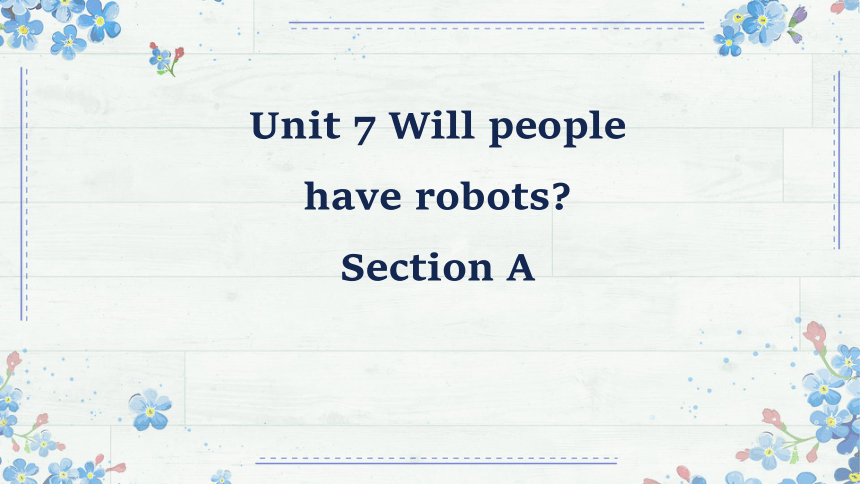 | |
| 格式 | pptx | ||
| 文件大小 | 30.8MB | ||
| 资源类型 | 教案 | ||
| 版本资源 | 人教新目标(Go for it)版 | ||
| 科目 | 英语 | ||
| 更新时间 | 2023-11-23 10:59:00 | ||
图片预览

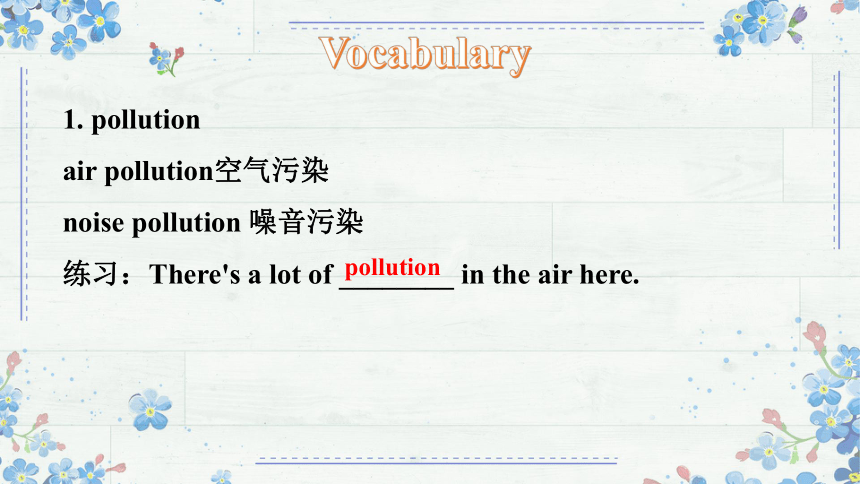
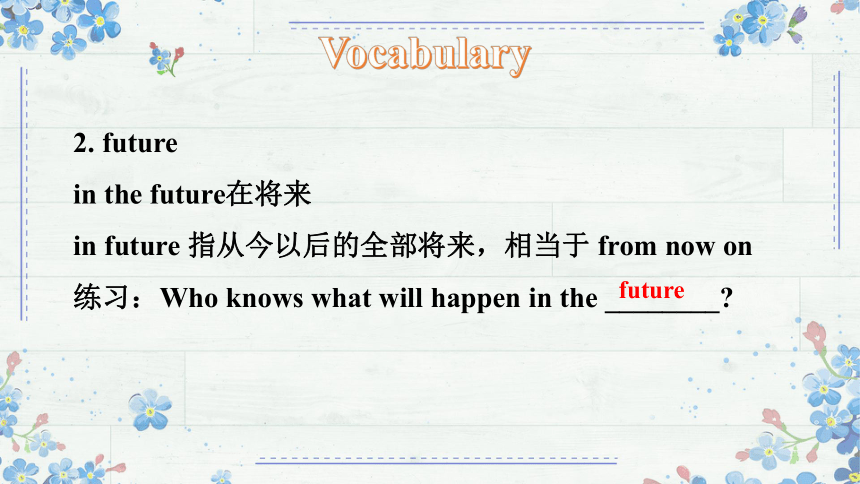
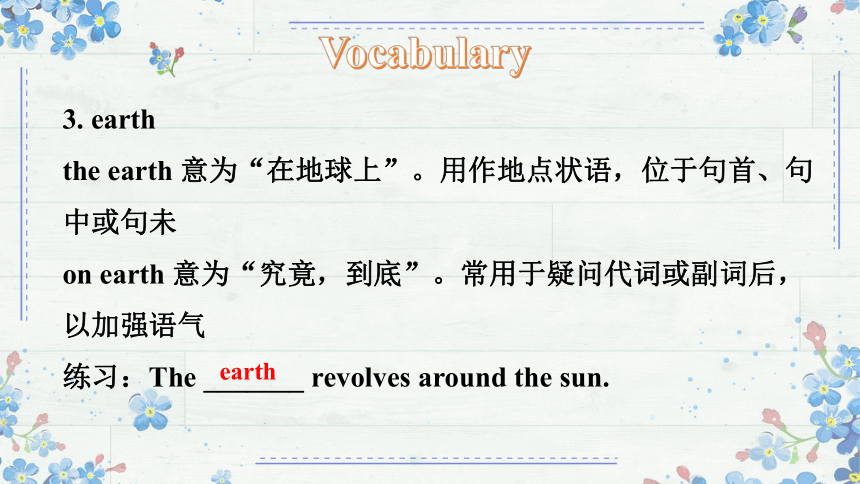
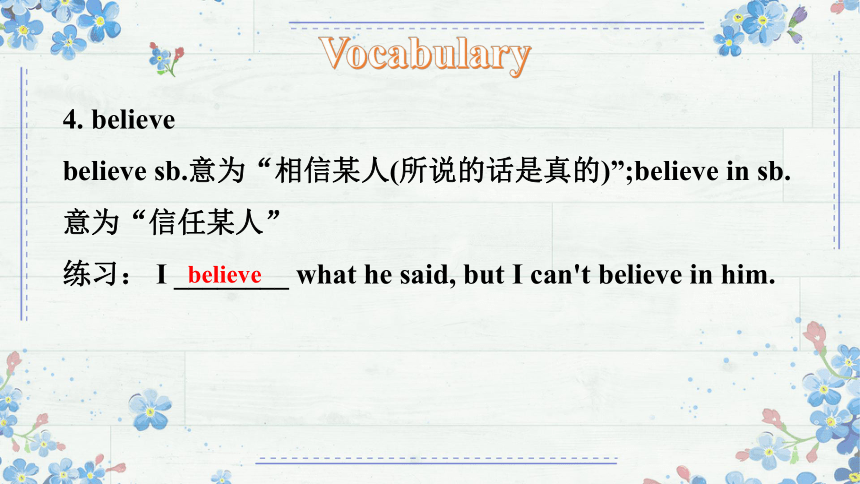

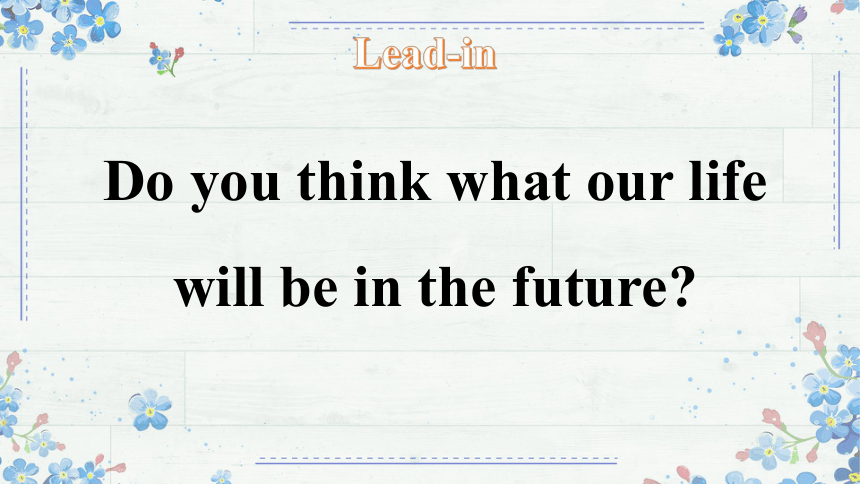
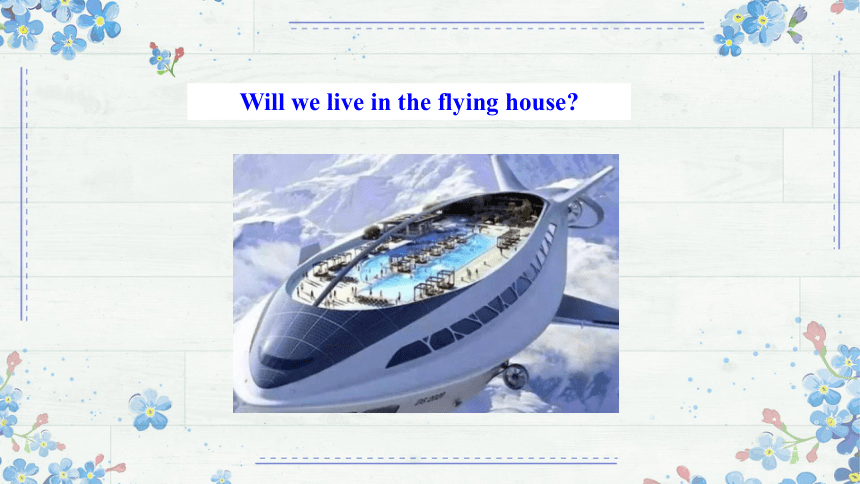
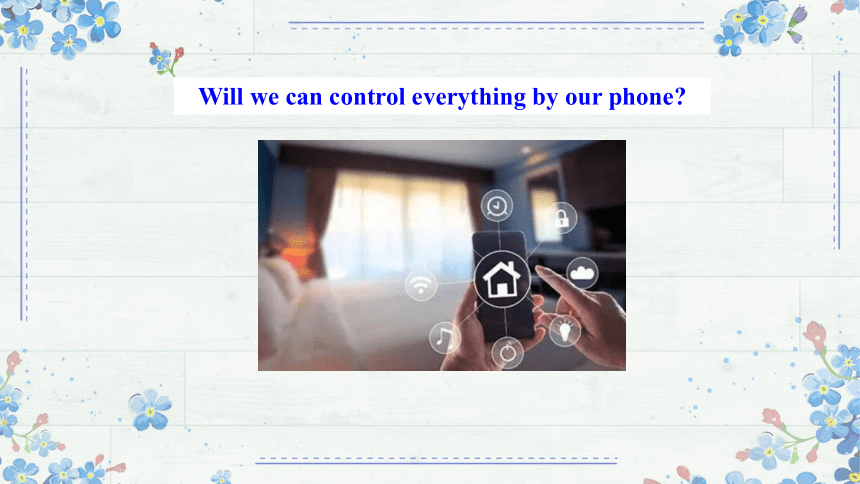
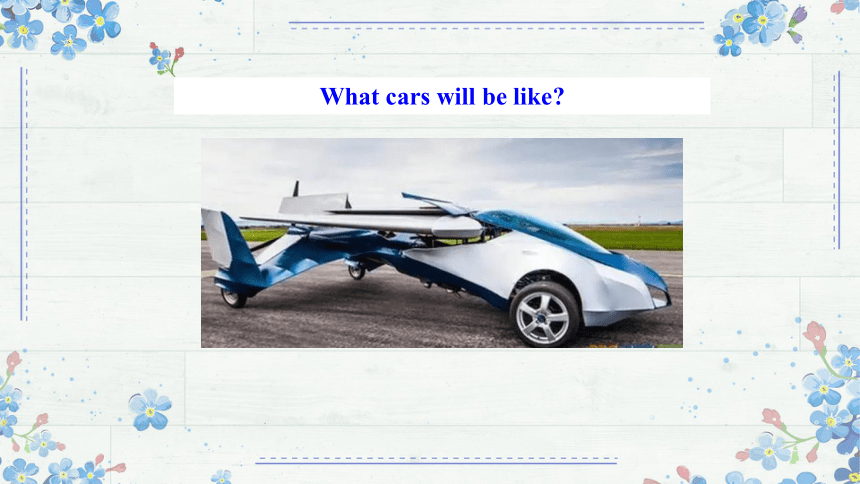
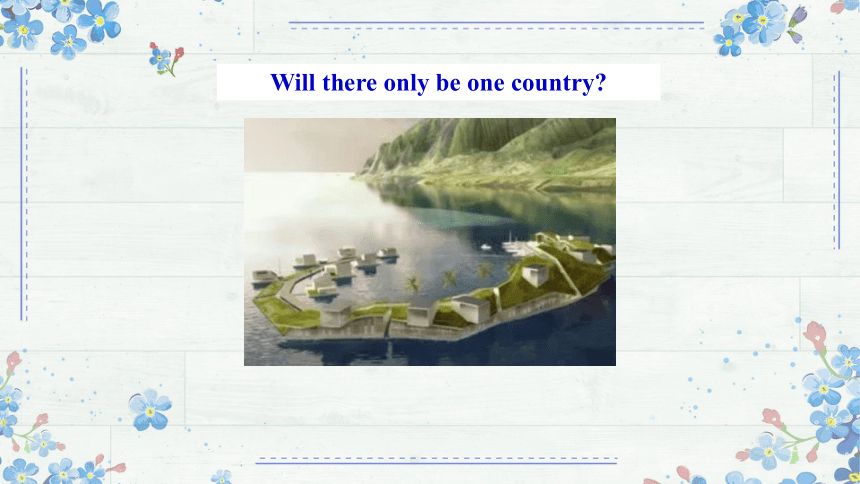
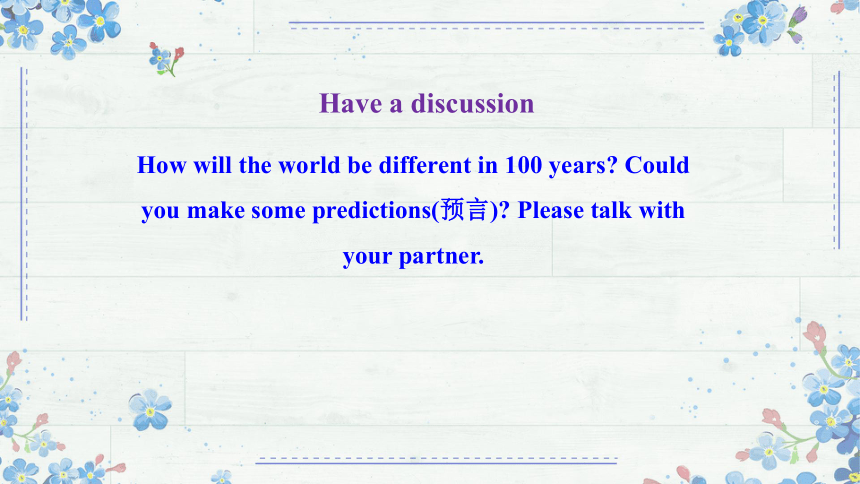
文档简介
(共30张PPT)
Unit 7 Will people have robots
Section A
Vocabulary
1. pollution
air pollution空气污染
noise pollution 噪音污染
练习:There's a lot of ________ in the air here.
pollution
Vocabulary
2. future
in the future在将来
in future 指从今以后的全部将来,相当于 from now on
练习:Who knows what will happen in the ________
future
Vocabulary
3. earth
the earth 意为“在地球上”。用作地点状语,位于句首、句中或句未
on earth 意为“究竟,到底”。常用于疑问代词或副词后,以加强语气
练习:The _______ revolves around the sun.
earth
Vocabulary
4. believe
believe sb.意为“相信某人(所说的话是真的)”;believe in sb.意为“信任某人”
练习: I ________ what he said, but I can't believe in him.
believe
Vocabulary
4. believe
believe sb.意为“相信某人(所说的话是真的)”;believe in sb.意为“信任某人”
练习: I ________ what he said, but I can't believe in him.
believe
Lead-in
Do you think what our life will be in the future
Will we live in the flying house
Will we can control everything by our phone
What cars will be like
Will there only be one country
Have a discussion
How will the world be different in 100 years Could you make some predictions(预言) Please talk with your partner.
1a
How will the world be different 100 years from now Read these predictions. Check ( √ ) A for agree or D for disagree.
A D
A D
A D
A D
A D
A D
1.People will have robots in their homes.
2.People won’t use money. Everything will be free.
3. Books will only be on computers, not on paper.
4. Kids won’t go to school. They’ll study at home on computers.
5.There will be only one country.
6. People will live to be 200 years old.
1b
Listen and circle the predictions you hear in 1a.
People will have robots in their homes.
People won’t use money. Everything will be free.
Books will only be on computers, not on paper.
Kids won’t go to school. They’ll study at home
on computers.
5. There will be only one country.
6. People will live to be 200 years old.
1c
Ask and answer questions about the predictions in 1a.
2a
Listen and circle the words you hear.
There will be (more / less / fewer) people.
There will be (more / less / fewer) free time.
There will be (more / less / fewer) cars.
There will be (more / less / fewer) pollution.
There will be (more / less / fewer) trees.
2b
Listen again. Check(√)the predictions you hear.
____ 1. There will be fewer people.
____ 2. There will be less free time.
____ 3. People will use the subways less.
____ 4. There will be more pollution.
____ 5. Cities will be very big and crowded.
√
√
2c
Make conversations about the predictions in 2a and 2b.
A: What’s your prediction about the future
B: I think there will be more pollution.
A: Really I don’t think so. But I think there
will be fewer trees.
2d
Read the conversation quickly and answer questions.
What will the future be like according to the book about the future
2. What can people do to save the earth
Cities will be more crowded and polluted. There will be fewer trees and the environment will be in great danger. Maybe people will have to move to other planets.
We can use less water and plant more trees. Everyone should play a part in saving the earth.
Will ... in 100 years
Yes, …will./ No, ...won’t.
1. Do you think there will be robots in people’s homes
there will be 意为“将会有……”,是there be句型的一般将来时结构,可与there is/are going to be...进行句式转换。
there be句型遵循“就近一致”的原则,即离be
近的是单数或不可数名词,be动词就用单数;离be近的是复数名词,be动词就用复数。
2. People will live to be 200 years old.
人们将会活到200岁。
live to be+基数词+years old,意思是“活到……岁”。其中live作动词,意为“活……;生活”。
(1)live on sth.意为“靠……为生”,这里的 sth.常为表示“食物”的名词;live on sb. 则表示“靠某人生活”。
(2)live by ...表示“靠……(手段)谋生”,by后通常跟表示方式、手段的动名词。
3. Will people use money in 100 years
100年以后人们还使用钱吗?
in 100 years “在100年以后”,in为介词,其后跟一段时间表示“在……之后”,通常用于一般将来时,对其提问要用how soon(多久以后)。
4. There will be (more/less/fewer) people.
将会有(更多/更少/更少的)人。
more是many和much的比较级,“更多的”,既可以修饰可数名词复数,也可以修饰不可数名词。
Grammar Focus
一般将来时
1概念
般将来时表示将来某个时间要发生的动作或存在的状态,也表示将来经常或反复发生的动作,常与表示将来的时间状语连用,如:tomorrow,next week,next year,in the future 等
例:I will go back to my hometown next week.下周我将返回家乡
We will come to see you every Sunday.我们将在每个周日来看望你
2句式结构
(1)肯定句:主语+ will/shall// be going to+动词原形+其他
will 用于各种人称,shall用于第一人称,be 随人称、数和时态的变化而变化,will在人称代词后常简略为"。
例: They'll have a test next week.他们下周将进行测验
We will/shall visit the Summer Palace.我们将游览颐和园
(2)否定句: 在 will/shall//be 后加 not。
例: The girls won't play tennis this afternoon.
这些女孩儿们今天下午不打网球。
He isn't going to join the club.他将不参加俱乐部了
(3)一般疑问句:将will/shall/be 提到主语前面
例:Will the students watch the match 学生们将去看比赛吗
Shall we go to the z00 tomorrow 明天我们去动物园吗
No,we shan't.不,我们不去
Are you going to visit your friends 你将去看望你的朋友们吗
3. there be句型的一般将来时
there be句型的一般将来时的构成是"There will be+主语+其他”或“There is/ are going to be+主语+其他
4.一般现在时表将来
(1)表示按规定或时间表预计要发生的动作用一般现在时表将来,这样的动词有start,leave,come,go 等。
例: The term starts on September 1st. 这个学期将于9月1日开学
(2)在时间或条件状语从句中,要用一般现在时表示将来
例: We will have a sports meeting if it doesn't rain next Friday.
如果下周五不下雨,我们将举行一次运动会
5.现在进行时表将来
某些表示趋向性或转移性的动词,常用现在进行时表示将来,如 come,go,fly, arrive, leave 等。
例: They are leaving for Beijing tomorrow.明天他们将动身去北京。
They are flying to Guangdong next Sunday.下周日他们将飞往广东
Fill in the blanks with more, less or fewer.
l. In the future, there will be _____ fresh water because there will be _______pollution in the sea.
2. In 100 years, there will be _______ cars because there will be _______people in the cities.
3. There will be ______ jobs for people because ______ robots will do the same jobs as people.
4. I think there will be _______ cities because people will build _______buildings in the country.
5. In 50 years, people will have ______ free time because there will be ______ things to do.
less
more
more
more
fewer
more
more
more
less
more
Complete the predictions with what you think will happen.
l. Kids study at school now. In 100 years, ________________________________
2. I sometimes see blue skies in my city, but in the future ______________________
3. People now usually live to be about 70-80 years old, but in the future
_________________________________________________________________
4. Families usually spend time together on weekends, but maybe in 200 years _________________________________________
______________________________________________________________________
kids will study at home on computers.
I will often see blue skies.
people will live to be 200 years old.
kids will study at home on computers.
Draw a picture of what you think a city in the future will be like.
Then describe it to the class.
Unit 7 Will people have robots
Section A
Vocabulary
1. pollution
air pollution空气污染
noise pollution 噪音污染
练习:There's a lot of ________ in the air here.
pollution
Vocabulary
2. future
in the future在将来
in future 指从今以后的全部将来,相当于 from now on
练习:Who knows what will happen in the ________
future
Vocabulary
3. earth
the earth 意为“在地球上”。用作地点状语,位于句首、句中或句未
on earth 意为“究竟,到底”。常用于疑问代词或副词后,以加强语气
练习:The _______ revolves around the sun.
earth
Vocabulary
4. believe
believe sb.意为“相信某人(所说的话是真的)”;believe in sb.意为“信任某人”
练习: I ________ what he said, but I can't believe in him.
believe
Vocabulary
4. believe
believe sb.意为“相信某人(所说的话是真的)”;believe in sb.意为“信任某人”
练习: I ________ what he said, but I can't believe in him.
believe
Lead-in
Do you think what our life will be in the future
Will we live in the flying house
Will we can control everything by our phone
What cars will be like
Will there only be one country
Have a discussion
How will the world be different in 100 years Could you make some predictions(预言) Please talk with your partner.
1a
How will the world be different 100 years from now Read these predictions. Check ( √ ) A for agree or D for disagree.
A D
A D
A D
A D
A D
A D
1.People will have robots in their homes.
2.People won’t use money. Everything will be free.
3. Books will only be on computers, not on paper.
4. Kids won’t go to school. They’ll study at home on computers.
5.There will be only one country.
6. People will live to be 200 years old.
1b
Listen and circle the predictions you hear in 1a.
People will have robots in their homes.
People won’t use money. Everything will be free.
Books will only be on computers, not on paper.
Kids won’t go to school. They’ll study at home
on computers.
5. There will be only one country.
6. People will live to be 200 years old.
1c
Ask and answer questions about the predictions in 1a.
2a
Listen and circle the words you hear.
There will be (more / less / fewer) people.
There will be (more / less / fewer) free time.
There will be (more / less / fewer) cars.
There will be (more / less / fewer) pollution.
There will be (more / less / fewer) trees.
2b
Listen again. Check(√)the predictions you hear.
____ 1. There will be fewer people.
____ 2. There will be less free time.
____ 3. People will use the subways less.
____ 4. There will be more pollution.
____ 5. Cities will be very big and crowded.
√
√
2c
Make conversations about the predictions in 2a and 2b.
A: What’s your prediction about the future
B: I think there will be more pollution.
A: Really I don’t think so. But I think there
will be fewer trees.
2d
Read the conversation quickly and answer questions.
What will the future be like according to the book about the future
2. What can people do to save the earth
Cities will be more crowded and polluted. There will be fewer trees and the environment will be in great danger. Maybe people will have to move to other planets.
We can use less water and plant more trees. Everyone should play a part in saving the earth.
Will ... in 100 years
Yes, …will./ No, ...won’t.
1. Do you think there will be robots in people’s homes
there will be 意为“将会有……”,是there be句型的一般将来时结构,可与there is/are going to be...进行句式转换。
there be句型遵循“就近一致”的原则,即离be
近的是单数或不可数名词,be动词就用单数;离be近的是复数名词,be动词就用复数。
2. People will live to be 200 years old.
人们将会活到200岁。
live to be+基数词+years old,意思是“活到……岁”。其中live作动词,意为“活……;生活”。
(1)live on sth.意为“靠……为生”,这里的 sth.常为表示“食物”的名词;live on sb. 则表示“靠某人生活”。
(2)live by ...表示“靠……(手段)谋生”,by后通常跟表示方式、手段的动名词。
3. Will people use money in 100 years
100年以后人们还使用钱吗?
in 100 years “在100年以后”,in为介词,其后跟一段时间表示“在……之后”,通常用于一般将来时,对其提问要用how soon(多久以后)。
4. There will be (more/less/fewer) people.
将会有(更多/更少/更少的)人。
more是many和much的比较级,“更多的”,既可以修饰可数名词复数,也可以修饰不可数名词。
Grammar Focus
一般将来时
1概念
般将来时表示将来某个时间要发生的动作或存在的状态,也表示将来经常或反复发生的动作,常与表示将来的时间状语连用,如:tomorrow,next week,next year,in the future 等
例:I will go back to my hometown next week.下周我将返回家乡
We will come to see you every Sunday.我们将在每个周日来看望你
2句式结构
(1)肯定句:主语+ will/shall// be going to+动词原形+其他
will 用于各种人称,shall用于第一人称,be 随人称、数和时态的变化而变化,will在人称代词后常简略为"。
例: They'll have a test next week.他们下周将进行测验
We will/shall visit the Summer Palace.我们将游览颐和园
(2)否定句: 在 will/shall//be 后加 not。
例: The girls won't play tennis this afternoon.
这些女孩儿们今天下午不打网球。
He isn't going to join the club.他将不参加俱乐部了
(3)一般疑问句:将will/shall/be 提到主语前面
例:Will the students watch the match 学生们将去看比赛吗
Shall we go to the z00 tomorrow 明天我们去动物园吗
No,we shan't.不,我们不去
Are you going to visit your friends 你将去看望你的朋友们吗
3. there be句型的一般将来时
there be句型的一般将来时的构成是"There will be+主语+其他”或“There is/ are going to be+主语+其他
4.一般现在时表将来
(1)表示按规定或时间表预计要发生的动作用一般现在时表将来,这样的动词有start,leave,come,go 等。
例: The term starts on September 1st. 这个学期将于9月1日开学
(2)在时间或条件状语从句中,要用一般现在时表示将来
例: We will have a sports meeting if it doesn't rain next Friday.
如果下周五不下雨,我们将举行一次运动会
5.现在进行时表将来
某些表示趋向性或转移性的动词,常用现在进行时表示将来,如 come,go,fly, arrive, leave 等。
例: They are leaving for Beijing tomorrow.明天他们将动身去北京。
They are flying to Guangdong next Sunday.下周日他们将飞往广东
Fill in the blanks with more, less or fewer.
l. In the future, there will be _____ fresh water because there will be _______pollution in the sea.
2. In 100 years, there will be _______ cars because there will be _______people in the cities.
3. There will be ______ jobs for people because ______ robots will do the same jobs as people.
4. I think there will be _______ cities because people will build _______buildings in the country.
5. In 50 years, people will have ______ free time because there will be ______ things to do.
less
more
more
more
fewer
more
more
more
less
more
Complete the predictions with what you think will happen.
l. Kids study at school now. In 100 years, ________________________________
2. I sometimes see blue skies in my city, but in the future ______________________
3. People now usually live to be about 70-80 years old, but in the future
_________________________________________________________________
4. Families usually spend time together on weekends, but maybe in 200 years _________________________________________
______________________________________________________________________
kids will study at home on computers.
I will often see blue skies.
people will live to be 200 years old.
kids will study at home on computers.
Draw a picture of what you think a city in the future will be like.
Then describe it to the class.
同课章节目录
- Unit 1 Where did you go on vacation?
- Section A
- Section B
- Unit 2 How often do you exercise?
- Section A
- Section B
- Unit 3 I'm more outgoing than my sister.
- Section A
- Section B
- Unit 4 What's the best movie theater?
- Section A
- Section B
- Unit 5 Do you want to watch a game show?
- Section A
- Section B
- Unit 6 I'm going to study computer science.
- Section A
- Section B
- Unit 7 Will people have robots?
- Section A
- Section B
- Unit 8 How do you make a banana milk shake?
- Section A
- Section B
- Unit 9 Can you come to my party?
- Section A
- Section B
- Unit 10 If you go to the party, you'll have a grea
- Section A
- Section B
